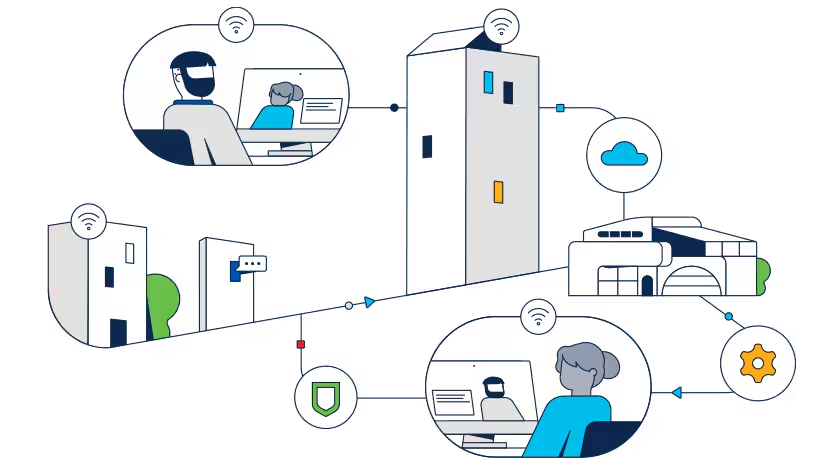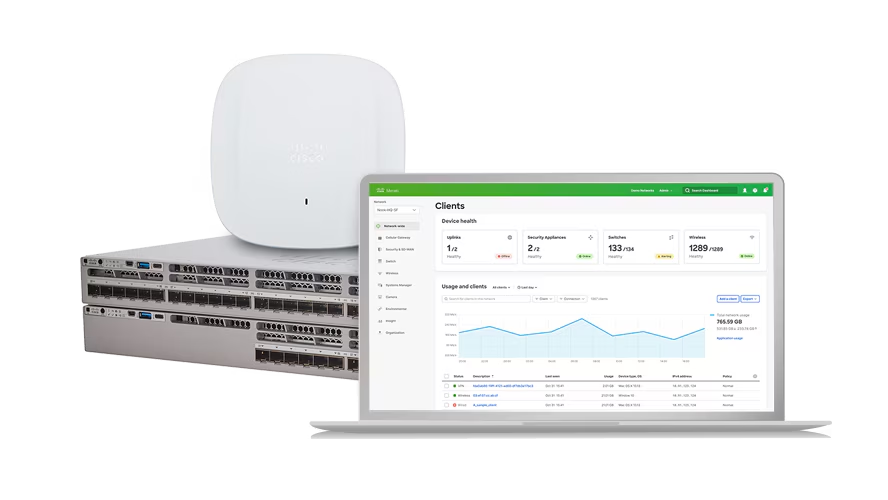
































In today’s fast-evolving digital landscape, wireless connectivity is critical to achieving seamless communication, operational efficiency, and workplace transformation. Cisco, a global leader in networking, offers a comprehensive suite of wireless access points (APs) designed to meet the needs of businesses, from small enterprises to large-scale industrial setups. With cutting-edge technology like Wi-Fi 6E and Wi-Fi 7, Cisco wireless APsensure secure, intelligent, and reliable connectivity for every environment.
Wireless access points (APs) are networking devices that extend wireless connectivity to users and IoT devices within a defined area. Cisco’s wireless APs provide high-performance Wi-Fi solutions, enabling organizations to deliver seamless internet access with built-in security, IoT readiness, and advanced management capabilities.

Cisco APs are built to handle high-density environments, offering robust performance even during peak usage. The introduction of Wi-Fi 7 technology allows faster data transfer speeds, reduced latency, and enhanced device capacity.
With encrypted threat detection and automated monitoring, Cisco APs protect networks from advanced security threats. This ensures airtight security for sensitive data and secure connections for unmanaged devices across campuses and WANs.
Cisco leverages AI to provide real-time insights, optimize network performance, and deliver proactive issue resolution. This intelligence guarantees exceptional user experiences across owned and third-party networks.
Cisco APs support the growing demand for IoT device management and smart building capabilities. They integrate seamlessly with Cisco Spaces to provide actionable insights, such as real-time location tracking, asset management, and environmental monitoring.
Cisco’s cloud-managed Meraki platform enables IT teams to monitor and manage networks remotely. With zero-touch deployment, innovative management tools, and full-stack visibility, Meraki simplifies network administration.
Ideal for offices, schools, and healthcare facilities, Cisco’s indoor APs offer reliable coverage and support for high-capacity environments.
Designed for rugged conditions, these APs ensure resilient connectivity in outdoor and industrial settings, such as factories and remote sites.
Powered by Cisco Meraki, cloud-managed APs deliver a streamlined setup process, advanced analytics, and remote management capabilities, making them ideal for distributed networks.
With Wi-Fi 6E and Wi-Fi 7 support, Cisco APs prepare organizations for the next generation of wireless networking. These technologies enhance speed, reduce interference, and allow more devices to connect simultaneously.
Cisco’s AI-powered assurance features ensure uninterrupted connectivity, making them ideal for latency-sensitive applications like video conferencing, gaming, and virtual reality.
Cisco APs are designed to integrate IoT sensors and devices, offering centralized monitoring and management tools to enhance operational efficiency.
Cisco’s wireless solutions grow with your organization. Whether you need connectivity for a small office or a large industrial complex, Cisco APs can be customized to meet your specific requirements.
Advanced threat detection, automated updates, and encrypted communications provide a robust security framework for protecting data and ensuring regulatory compliance.
Delivering exceptional performance and flexibility, the Catalyst 9100 series supports Wi-Fi 6E and Wi-Fi 7. These APs are built to handle high-density and mission-critical environments with ease.
The Meraki cloud-first platform provides easy deployment and management for distributed networks, ensuring powerful wireless experiences without requiring extensive on-site expertise.
Cisco DNA software enhances network intelligence, enabling advanced analytics, proactive troubleshooting, and efficient resource allocation.
Transform physical spaces into smart workplaces using data insights. Cisco Spaces integrates with APs to offer services like real-time monitoring, environmental sensing, and workflow optimization.
Cisco’s low-latency 6 GHz Wi-Fi powers immersive VR gaming platforms like Zero Latency in Australia. By delivering seamless connectivity, Cisco ensures an unmatched gaming experience.
Hospitals use Cisco’s secure wireless networks to manage IoT-enabled medical devices, ensuring patient data safety and improving operational efficiency.
In manufacturing plants, Cisco’s outdoor and industrial APs facilitate real-time monitoring and automation, enhancing productivity and safety.
Cisco simplifies the transition to next-generation wireless technology, offering a seamless upgrade path from Wi-Fi 6E to Wi-Fi 7. Businesses can experience faster connections, smarter devices, and enhanced security without the complexity of a major infrastructure overhaul.
1. What is the difference between Cisco Catalyst and Cisco Meraki access points?
Cisco Catalyst APs are ideal for highly customized on-premises networks, while Meraki APs offer cloud-managed solutions with simple setup and remote management.
2. Can Cisco APs support IoT devices?
Yes, Cisco APs are IoT-ready, allowing organizations to monitor and manage IoT devices effectively through centralized dashboards.
3. What industries benefit most from Cisco wireless solutions?
Cisco APs cater to diverse industries, including healthcare, education, manufacturing, and retail, by providing tailored solutions for specific needs.
4. How secure are Cisco wireless access points?
Cisco APs include advanced security features, such as encrypted threat detection and automatic updates, to safeguard networks from evolving threats.
5. Is Wi-Fi 7 backward compatible with older devices?
Yes, Wi-Fi 7 supports backward compatibility, ensuring seamless operation with existing Wi-Fi 6 and 6E devices.
6. How can I manage my Cisco wireless network remotely?
Cisco’s Meraki platform provides a cloud-based dashboard for easy remote monitoring and management of your wireless network.
Cisco wireless access points are the cornerstone of future-proof networking, offering unparalleled performance, security, and scalability. By embracing innovations like Wi-Fi 7, IoT integration, and AI-driven intelligence, Cisco empowers organizations to transform their workspaces into smart, efficient, and connected environments.
AP e controladores Cisco Wireless
For Cisco product list and quote, please visit: https://www.hi-network.com/categories/cisco or contact us at www.hi-network.com (Email: [email protected])
 Tags quentes :
hot products
Tags quentes :
hot products